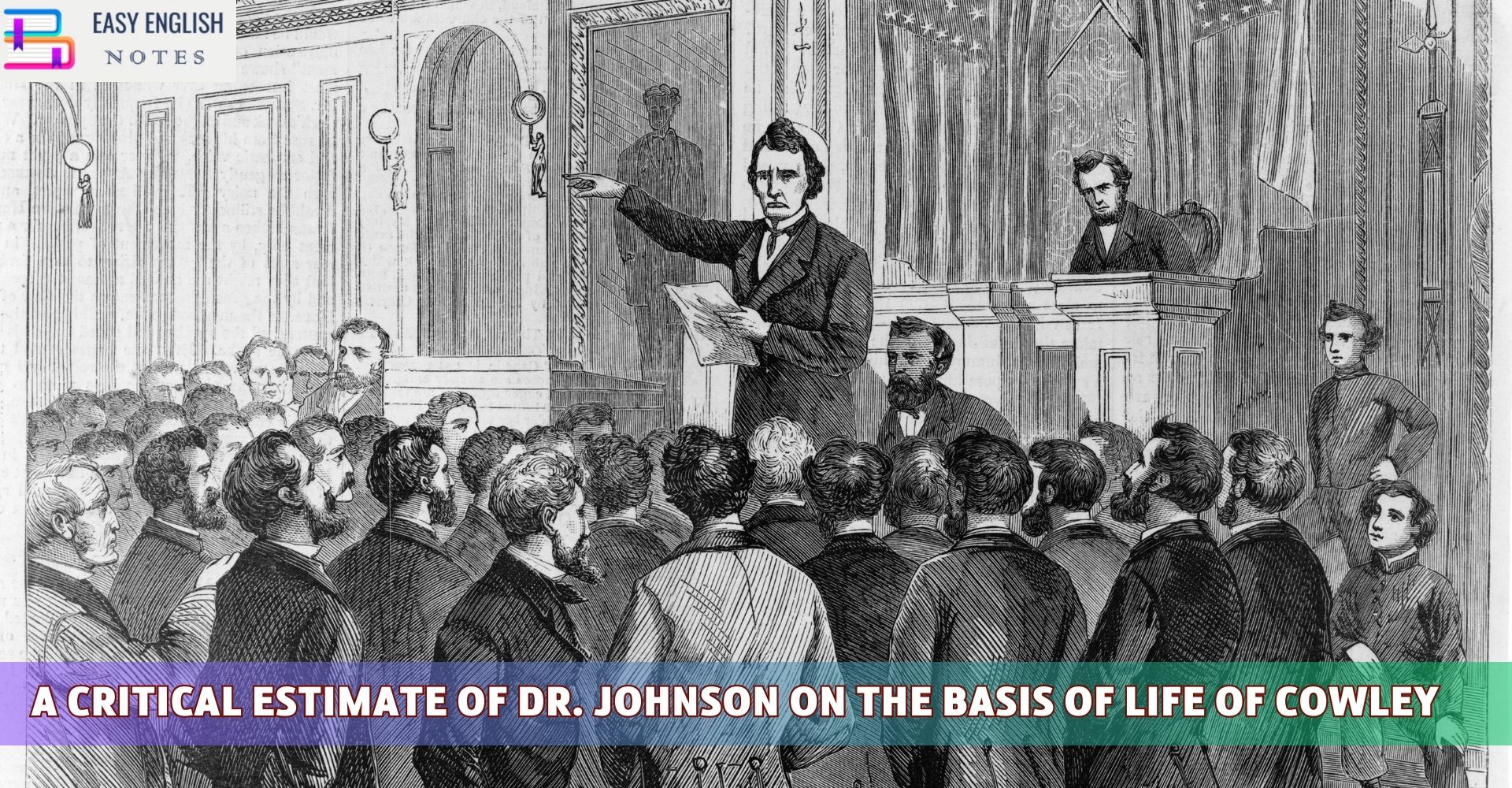Dr. Samuel Johnson, one of the foremost literary figures of the 18th century, is perhaps best known for his critical works, including his estimations of various poets. His critique of Abraham Cowley in “The Life of Cowley,” part of his larger work “Lives of the Most Eminent English Poets,” is a significant piece that reflects Johnson’s critical approach and literary values.
Critical Approach and Evaluation of Cowley
- Advocate for Classical Realism: In his evaluation of Cowley, Johnson exhibits his preference for classical realism over the ornate and decorative style of the Metaphysical poets. Cowley, being a leading figure of this school, often employed elaborate conceits, which Johnson found to be overly contrived and lacking in true emotional depth.
- Emphasis on Moral Didacticism: Johnson, who valued literature’s role in moral instruction, criticized Cowley for not fulfilling this function effectively. He believed that poetry should serve a higher purpose – to educate and morally guide its readers, an aspect he found somewhat lacking in Cowley’s work.
- Concerns with Metaphysical Wit: Johnson was critical of the Metaphysical poets, including Cowley, for their excessive use of wit and intellectual playfulness. He argued that their complex metaphors and extended conceits were more about showcasing the poet’s cleverness than expressing genuine emotion or truth.
- Appreciation of Poetic Craftsmanship: Despite his criticisms, Johnson acknowledged Cowley’s skill and innovation as a poet. He recognized Cowley’s influence on English poetry, noting his adeptness with language and verse, even if he found fault with the direction in which Cowley took his talents.
- Engagement with the Poet’s Life: Johnson’s critique was not limited to Cowley’s poetry. He also delved into Cowley’s life, believing that understanding the poet’s character and experiences was crucial to fully appreciating his work. This approach reflects Johnson’s broader view on the inseparable connection between a writer’s life and their literary output.
Legacy of Johnson’s Critique
Dr. Johnson’s critique of Cowley is emblematic of his broader literary judgments. His emphasis on moral didacticism, emotional authenticity, and clarity of expression over stylistic excess has had a lasting impact on literary criticism. While modern readers may find some of his judgments too rigid or moralistic, his work undeniably helped to shape the course of English literary criticism and remains a crucial point of reference for understanding the evolution of poetic taste and standards.
In sum, Johnson’s critique of Cowley in “The Life of Cowley” provides a valuable insight into Johnson’s critical ethos and his influence on the literary landscape. His assessments reflect a deep engagement with both the form and function of poetry, stressing a balance between intellectual prowess and emotional authenticity.
Also Read :
- Compare Hamlet with Macbeth, Othello and other Tragedies
- “The Pardoner’s Tale” is the finest tale of Chaucer
- Prologue to Canterbury Tales – (Short Ques & Ans)
- Confessional Poetry – Definition & meaning
- Line By Line Explanation Of The Poem The Eve of St. Agnes
The analysis of Dr. Samuel Johnson’s critical estimate in “Life of Cowley,” his methodology and perspectives further illustrate the evolving nature of literary criticism during the 18th century and its enduring influence.
Balancing Historical Context with Literary Merit
Johnson’s critique of Cowley also shows his attempt to balance the historical context with the inherent literary merit of the work. While he was critical of the Metaphysical poets’ style, Johnson also recognized the historical significance of their contributions to English literature. He understood that Cowley and his contemporaries were products of their time, and their innovations, though not entirely aligning with his tastes, were significant in the historical development of poetry.
Criticism Reflecting Changing Tastes
The critical estimate provided by Johnson on Cowley also reflects the changing tastes of the time. The 18th century marked a shift from the ornate and elaborate style of the Metaphysical poets to a more restrained and clear expression in poetry. Johnson’s criticisms can be seen as a response to this shift, advocating for a style that aligns more closely with the emerging Neoclassical ideals of his era.
Influence on Future Criticism and Poetics
Johnson’s critique in “Life of Cowley” had a lasting impact on the field of literary criticism. His method of combining biographical insights with literary analysis became a standard approach in later critical works. Moreover, his emphasis on moral didacticism and emotional sincerity influenced the values and criteria used by future critics and poets in evaluating and composing poetry.
A Balanced Perspective on Johnson’s Critique
While modern readers might find Johnson’s critique somewhat limited by his moralistic and neoclassical biases, it’s essential to understand his work within its historical context. Johnson was not just critiquing Cowley; he was, in many ways, setting the parameters for what he believed poetry should achieve in society. His work remains a critical resource for understanding the evolution of literary standards and the role of a critic in shaping public taste and perception of literature.
In conclusion, Dr. Samuel Johnson’s “Life of Cowley” is more than just a critique of a single poet; it is a reflection of Johnson’s broader literary and moral philosophy. His analysis goes beyond Cowley’s work, offering insights into the nature of poetry, the role of the poet, and the evolving criteria of literary excellence. Johnson’s work, despite its inherent biases, remains a vital piece in the mosaic of literary criticism and an indispensable tool for understanding the dynamics of literary evaluation and appreciation.
PLEASE HELP ME TO REACH 1000 SUBSCRIBER ON MY COOKING YT CHANNEL (CLICK HERE)











